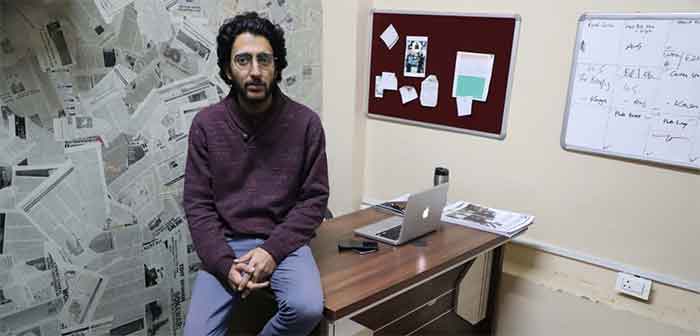The re-arrest of Fahad Shah, Editor of The Kashmir Walla, in politically motivated cases is another sign of the deepening crackdown on media freedom in Kashmir.

Fahad Shah, a prominent Kashmiri journalist, was arrested on 4 February under the draconian Unlawful Activities Prevention Act (UAPA) and other offences including sedition for allegedly “uploading anti-national content, including photographs, videos and posts with criminal intention to create fear”. The Kashmir police have accused him of “glorifying terrorism” and spreading fake news. If convicted, Mr Shah could be imprisoned for life.
Mr. Shah was granted bail by the Special Court, but was “re-arrested” in another case in south Kashmir on the 26th February. Shah’s re-arrest is not only unwarranted and illegal but has to be seen in the backdrop of the increased attack on media and civil liberties in the Valley in the last 3 years. It is also the latest blow against freedom of expression in Kashmir. Since the revocation of Jammu and Kashmir’s special status in November 2019, Prime Minister Narendra Modi’s government has stepped up its attacks on journalists and human rights activists in Kashmir.
The saga of arrest and re-arrest of Mr Shah only points to the acute systemic coercion being faced by Kashmiri journalists which has acquired a particularly brutal face in the last three years. What is being sought to be criminalized is the very profession of journalism with the cycle of intimidation and arrests spreading fear among journalists and stopping many of them from reporting from the ground. Journalists apprehend being subjected to 24×7 surveillance and they are asked to reveal sources for their stories. Credible stories based on sources and documents are questioned and labelled as propaganda as journalists are forced not to report such stories. Unfortunately in Kashmir today, the version of people or the victim regarding an incident/situation has been criminalized.
The Jammu and Kashmir police, who now report to the central Ministry of Home Affairs, have booked and arrested journalists under abusive laws like the UAPA and the Jammu and Kashmir Public Safety Act (PSA), which allows for detention without charge or trial. They have raided the homes of journalists and activists, seized their cell phones, increased surveillance on them, questioned and threatened journalists, restricted them from traveling abroad, and shut down news outlets.
Since August 5, 2019, the administration/police has summoned/questioned/verified antecedents of over 70 journalists, which includes physical presence in police stations and other units of the police. As of now at least three journalists are in jail, while one journalist is not traceable as a court had summoned him and later issued an arrest warrant. Families of journalists have also been the victims of this strategy of harassment by the state as they too are subject to fear and intimidation and suffer myriad indignities.
The administration has managed to silence the local media/newspapers by stopping government advertisements, which is their main source of income. The advertisements are released only after they toe a certain line of reporting. They have been informally asked to change the vocabulary in reports like writing ‘terrorist’ instead of ‘militants.’
The recently promulgated Central Media Accreditation Guidelines, 2022 is designed to make it impossible for journalists and media houses to report freely, independently and fearlessly by enabling the Government to withdraw accreditation of a journalist if a journalist acts in a `manner prejudicial to the country’s sovereignty, security, integrity, friendly relations with foreign states, public order’ or is charged with a serious cognisable offence. The sweeping powers can easily be invoked by the state agencies at the merest whiff of a journalistic piece critical of or questioning or disputing the government version of events, especially in troubled areas like the Kashmir valley. Thus with the new media policy Guidelines, the administration has made reporting even more difficult and hazardous by beginning a fresh verification process of all the journalists. The information department administration hasn’t issued the accreditation cards to journalists, which facilitates their attendance in high profile government functions.
The true nature of freedom of the media to function freely and fearlessly in India is captured by the fact that in 2020 the Paris based `Reporters without Borders’ (RSF) has ranked India in the 142nd place out of 180 countries on World Freedom Index, 2020.
The Kashmir Press Club, an independent media body, was closed by authorities last month. Human Rights Watch estimates that at least 35 journalists in Kashmir have faced police interrogation, raids, threats, physical assault, or fabricated criminal cases for their reporting since 2019. Authorities have repeatedly used the bogey of fake news and misinformation to target journalists whose reporting calls into question the official version of events.
In June 2021, the UN Special Rapporteur on Freedom of Expression and the UN Working Group on Arbitrary Detention wrote to the Indian government expressing concern at “acts of alleged arbitrary detention and intimidation of journalists covering the situation in Jammu and Kashmir”. In their communication, they mentioned previous incidents involving Mr Fahad Shah, including when he was arbitrarily detained and questioned multiple times, his home attacked with tear gas and his car windows broken.
The Editors Guild of India has condemned Mr Shah’s initial arrest, saying: “This arrest is part of a larger trend in Kashmir of security forces calling journalists for questioning and often detaining them, because of their critical reporting of the establishment.”
PUCL calls on Indian authorities to immediately release Fahad Shah and all other journalists in Kashmir, who have been targeted simply for doing their work, and drop all cases against them and cease the persecution of journalists. The government must respect the freedom of journalists who, as the Supreme Court said, are “vocal organs and the necessary agencies for the exercise of the rights of free speech and expression”. The UAPA, the J&K PSA, and Section 124A of the Indian Penal Code, which criminalizes sedition, must be repealed.
Dr. V. Suresh, General Secretary, PUCL









































